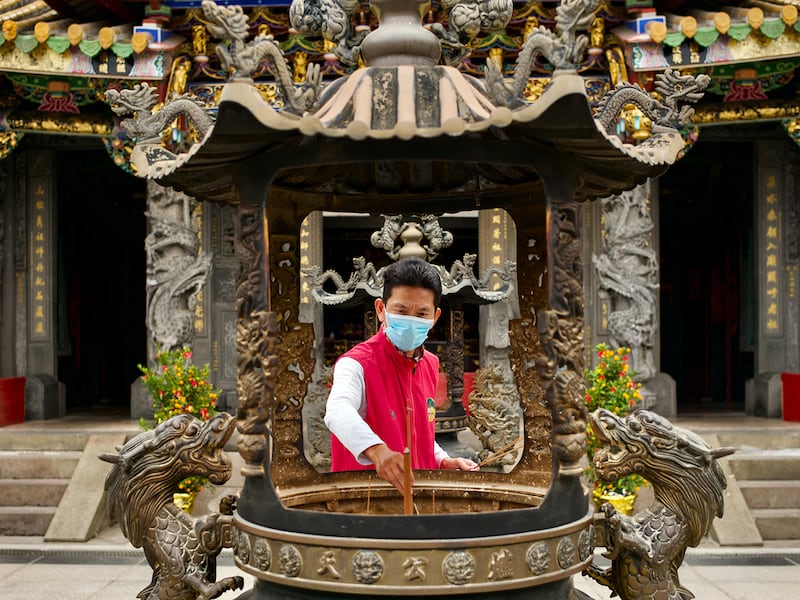The Chinese Communist Party’s United Front Work Department is counting on a new ally in the fight to persuade Taiwan’s 23 million people to give up their democratic way of life to be ruled by Beijing -- Cheng Huang, the god of cities.
Officials in the southeastern province of Fujian, just across the Taiwan Strait from self-ruled Taiwan, invited hundreds of Taoists, temple representatives, scholars and experts to a lavish cultural exchange event last month, according to the provincial government’s official website.
The event included seminars on Cheng Huang temples across Fujian as well as beliefs around the god in Taiwan, particularly in smaller towns on the island, the Nov. 14 report said.
Cheng Huang isn’t the first supernatural being to be enlisted by the Chinese Communist Party in pursuit of its political goals, in this case, to control Taiwan, whether by soft power and propaganda or by military force if necessary.
China has already tried to co-opt the sea goddess Matsu, widely revered in Taiwan, as part of a United Front operation targeting millions of voters.
And it has also encouraged the worship of the controversial Tibetan dharma protector Shugden, a move at loggerheads with the Tibetan Buddhist Gelugpa sect of the exiled spiritual leader, the Dalai Lama.

The United Front is a shadowy government agency in charge of seeking Chinese influence outside the country through individuals and often innocuous-sounding organizations.
The Chinese Communist Party embraces atheism and exercises tight controls over any form of religious practice among its citizens, requiring them to join government-backed governing bodies and to display the Chinese flag, along with other demonstrations of loyalty to Beijing.
But apparently it isn’t opposed to using religion to further its political objectives.
Religious cross-straits links
Cheng Huang emerged in Chinese folk belief as a spirit protector of city walls and moats, and later diversified into a more complex deity with his own following and underworld bureaucracy mirroring structures found in the land of the living.
“Cheng Huang culture is one of the important links connecting compatriots on both sides of the Taiwan Strait,” the report quoted Cheng Ming-hui of Taiwan’s Wuji Sanching Temple as saying.
“I hope we can to hold more such activities in the future to further enhance the understanding and friendship between believers on both sides of the Taiwan Strait,” Cheng said.
Taiwan has never been ruled by Beijing and is formally governed by the Republic of China government, formed after the 1911 fall of the Qing Dynasty under Sun Yat-sen, that later fled to Taipei after losing the civil war in 1949 to Mao Zedong’s communists on the mainland.
While China insists on eventual “unification” with Taiwan, by armed invasion if necessary, the majority of Taiwan’s 23 million people have no wish to give up their democratic way of life to submit to Chinese rule.
RELATED STORIES
China steps up political control over religious venues, sermons and activities
EXPLAINED: What is China’s United Front and how does it operate?
China targets Taiwan’s temples, Matsu worshippers in influence ops
Ho Cheng-Hui, who heads Taiwanese civil defense organization the Kuma Academy, said China likes to cash in politically on religious devotion of any kind, citing its involvement in the cult of Matsu as an example.
“They are catering to the customs of the Taiwanese people, but with other motives behind it,” Ho said. “They call it religious exchange, but actually it’s a United Front operation -- scholars have defined it as the warfare of influence in recent years.”
“Some Taiwanese take part in these so-called exchanges because of their religious feeling, or sense of the historical origins [of their beliefs],” he said. “But that’s not what’s happening here.”
He called on religious believers in Taiwan to become more aware of China’s motives, “so as not to be used” by Beijing.
‘Living chess pieces’
Wu Se-Chih, a researcher at Taiwan’s Cross-Straits Policy Association, agreed.
“There is also a certain degree of United Front motivation,” he said. “China will always try to leverage any United Front gains from the people of Taiwan.”
Wu said the “deep connection between folk beliefs and local politics” in Taiwan also offers a channel for funds to flow into -- and influence -- the island’s messily democratic political life.
The Chinese government has acquired a number of local temples in Taiwan in recent years, which he described as “living chess pieces” in Beijing’s hands, to boost its influence in Taiwanese politics at a local level.
“These interest groups haven’t been subjected to enough supervision,” Wu said. “That’s the main reason the Chinese Communist Party targets local temples.”
And there are also personal risks involved for any religious believers traveling to China, according to Wu, who cited the recent detention of three elderly Taiwanese members of the I-Kuan Tao religion in Zhongshan city.
“Sometimes the red lines aren’t very clear ... so people need to think twice and be vigilant, which is the best way to protect themselves,” Wu said.
Translated by Luisetta Mudie. Edited by Malcolm Foster.
